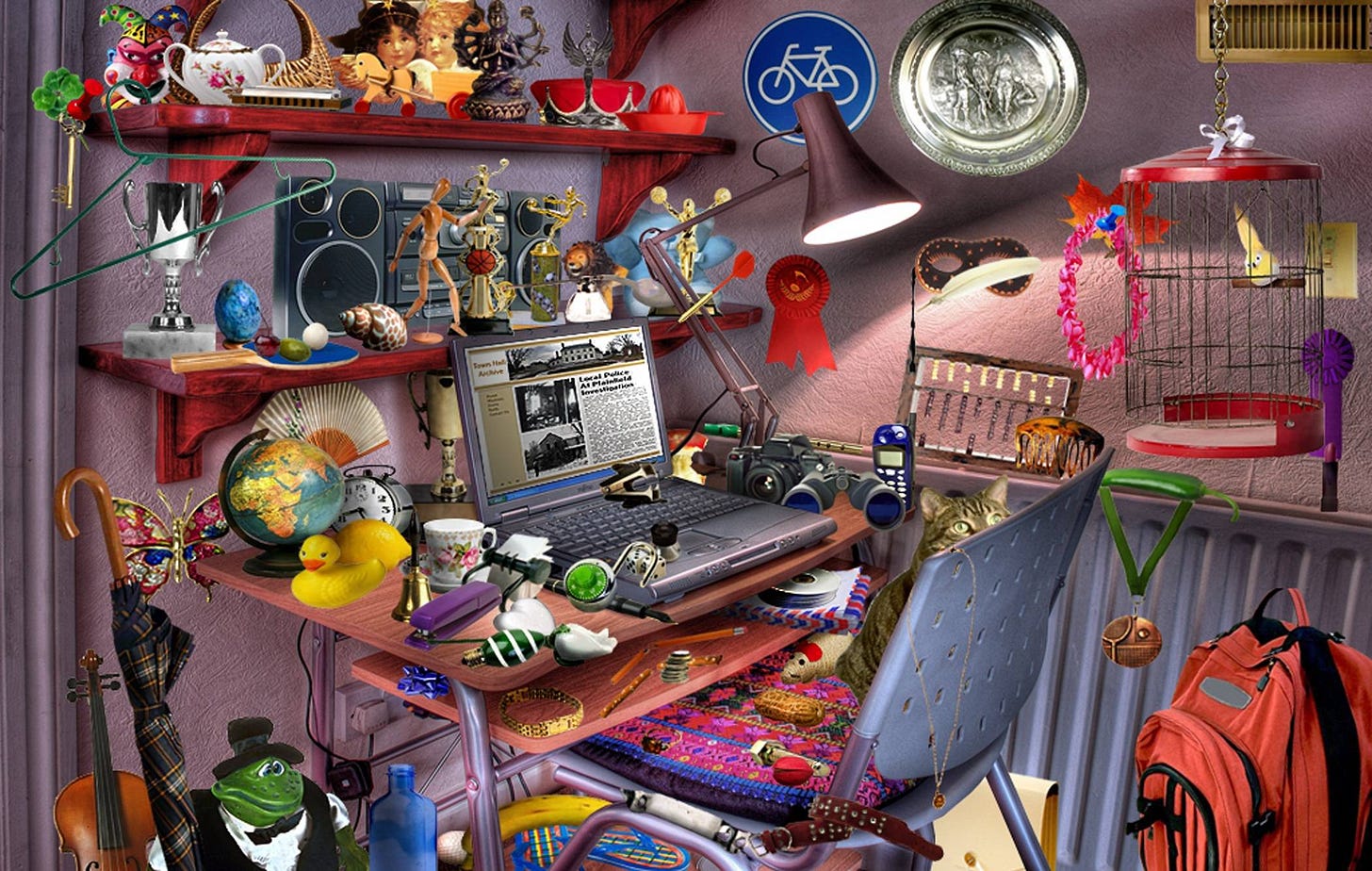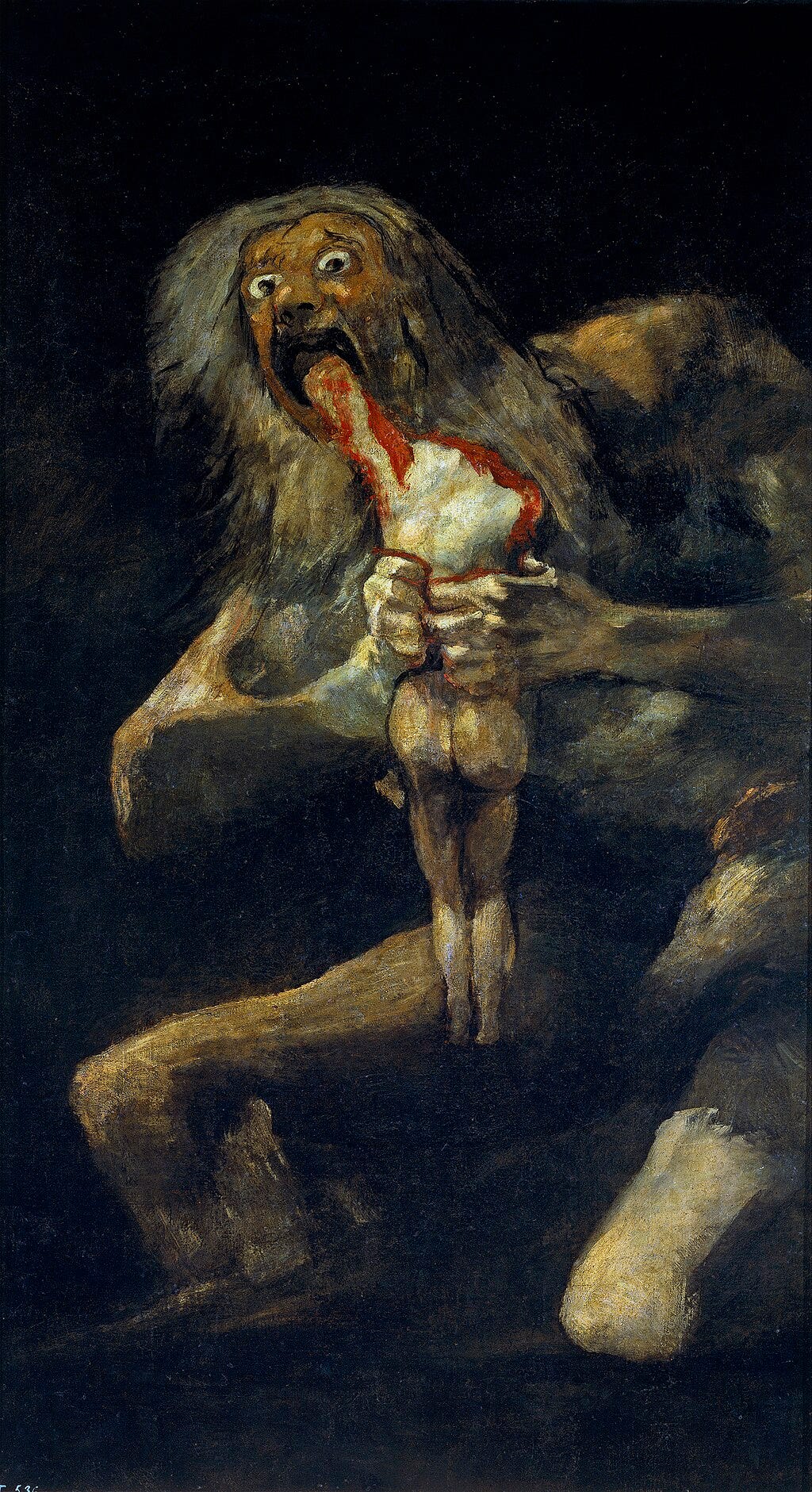Genres are Marketing Terms, and Your Advice is Bad.
Art is slippery. The firmer your grasp, the sooner it slips out of your hands.

One of the great (?) things about making and writing about games for 30 years is the patterns you get to see. Arguments that come up again and again. Mistakes that keep being made.
I've found that creators and writers often have a phase where they try to come up with their hard, fast rules for art. It's a way to fail to bring soothing order to a process that is unnervingly chaotic and unpredictable.
This isn’t useless. When you're new to an art form, you need to study it. Learn everything that has been done and what has worked and what didn't. Organize it into categories according to what inspires you and what doesn't. It's a healthy waypoint on the way to a productive process of shaking all old ideas of rules and categories off and doing whatever the hell you want.
The problem is when these ideas escape containment from the soothing calm of your Mind Palace and become Tweets. Then debates, then arguments. It's a process that has been going on as long as art's existed.
It's fun to argue, but when you start proclaiming, "This is the one true way to make work," or "These are the rules that define what this piece of art is," you're probably well on the way to wasting time. And time is precious. The most important debates happen inside your own head.
I have to confess at this point that I was inspired to write this by seeing multiple discussions on Twitter/X. It's a very bad idea to take seriously anything you see on Twitter/X. It's a medium designed to prevent complex thought, a pedant's paradise, and really a very very VERY small corner of human thought.
Still, these arguments happen everywhere always, and it's good to be inoculated.
So here's a brief taxonomy of how to Waste Your Time Talking About Video Games

Don't Make Hard Rules For How To Make Art!
Making video games is hard. [citation needed] There are a LOT of steps and a LOT of decisions to be made, technical and artistic. Things can go very wrong very quickly. Thus, it is important for creators to assemble and talk and trade tips for how to make things easier.
You run into trouble, however, when you try to make any hard, fast rule for how games are made. Art is slippery. There is ALWAYS an exception. As soon as you try to get a firm grasp on something, it gets away from you.
For example, there's this guy named James Silva. He is a highly successful indie game creator who makes really good action games (Salt and Sanctuary is the best-known one.)
This Absolute Madman never uses placeholder art. He can only really get going on his work when he's using final art. He does the art first! What a madman! Yet, you can't argue with the results.
Me, I make low-budget, story-heavy RPGs. I use the same engine and art, game after game, for years and years, only getting redone what I need for my current story. My games, by the modern standard, look like absolute dogs***.
I get hassled for it all the time, not just by customers but by pros who should know better. Yet, I'm going to have a full career writing indie games. You can't argue with the results.
When you make art, when you try to channel a Muse, you must figure out your own process. You must figure out the weird, magic set of steps that work for you to create. Then you must defend it.
Give people advice all you want. Debate as long as it's fun. Then do whatever it takes to get the work done.

Don't Struggle To Define Games Into Genres!
If you want to sell your work to an audience, you need to divide your art form up into rough categories. Subcategories of books include: "Mystery." "Romance." "Fiction." Subcategories of music include: "Jazz." "Rock." "Pop."
This is done as a courtesy to customers, to help them find the thing they want more efficiently. Video games have similar terms: "RPG." "Roguelike." "Metroidvania." "Indie."
Just never forget, they don't have hard, fast meanings! There's no swab test to tell if a game is "Survival Horror" or not. These are marketing terms, no more and no less. Vague but useful.
You run into trouble, however, when you try to come up with explicit definitions for them. Art is slippery and evades any attempt to lock it down with words. You simply can't come up with a complete, mathematical definition for whether a book is a "Western," or a song is "Pop," or a game is "role-playing."
Don't even try.
This is even more true now than it was in the past, because one of the best ways to innovate as an indie is to mix and match genres. "Match-3 RPG." "Roguelike Card Game." "Co-Op Action Puzzle Game With Brief Sections Containing Every Other Genre" (Puzzlequest, Slay the Spire, It Takes Two)
Defining a genre of any art is like trying to describe a cloud by drawing the cardboard box it's closest in shape too. You think you got it right, but then someone says, "But what about this example? Or that counter-example?" and mist starts leaking out of your box.
Note that genre confusion really frustrates me sometimes. When customers go to the RPG section of the Steam store, I want them to have a chance to see my games. They won't, however, because they are buried under a torrent of action games and visual novels, a lot of them porn. It bothers me, but I accept it, because I can't point at any of those titles and say, "I declare thee not an RPG! Begone!" It's my fault for working in such a vaguely defined genre.
A genre is a set of design choices, some more or less important. Don't look at the marketing term. Look at the design, and pick and choose the elements that inspire you most. Don't get hung up on rules.
Don't Find the One True Meaning Of Indie!
And, by the way, indie has always been a pure marketing term.
I mean, sure, we all kind of know what it means to be indie. Humble tinkerers, working on their own in garages or dingy, cheap offices, creating dreams free of huge monolithic business structures.
Yet, the games industry is huge and complex, and there are a billion sorts of business structures. I can't come up with a hard definition of indie. When I say my game is "indie," the term has a vague meaning defined by popular usage. People kind of know what I mean.
Recently, the video games industry observed The Game Awards, an annual infomercial with some award show qualities. They give an award for Best Indie Game. One of the nominees was Dave the Diver, which was made by a subdivision of a billion dollar company. We can debate what "indie means," but, um, that's not it, right?
Why was Dave the Diver nominated? Because it is kind of creative, and because it has pixel art. So that's what indie means now. Common usage defines words. Next week, a 2-D platformer with roguelike elements about a depressed gerbil will be indie, even if it's entirely made by Microsoft.
But I try not to worry about it. The truth is, Best Indie Game is already a condescending, meaningless award. In any given year, a huge chunk of the best games will be from small, independent studios, period.
"Indie" basically means, "We actually tried to make something creative!" That's a definition I can live with.

Don't Write a Manifesto!
By the way, if you are ever tempted to write a Manifesto about the True Meaning of video games, don't. You will be disappointed. (For fun, Google “Video game manifesto” and look at the multitude of misbegotten attempts.)
If you want to shape how games are made, the best way to lead is by example. Write a great game that inspires. THAT is what gets the kids to want to be like you. Be the change you want to see in the world.
You Just Gotta Stay Loose, Man!
When I see debates about rules for game creation, and categories to sort games into, I am reminded that this is, after all, a very young art form. Older art forms seem less prone to this because they've had much more time seeing rules get broken. The story of Painting is century after century of revolutions.
It really makes sense that game designers like rules. We are, after all, sculptors of rules. And it makes sense that we like firm categories, as many of us were drawn in by games that relied on the comfort of firm categories. (A charmander is never half of a fire type.)
But again, this art form is so young. Our revolutions come at the rate of several a decade. The things I've seen video games be able to do have expanded so much in just the last ten years.
Most of what I have written is obvious, I freely admit. But the punchline may not be: We have so much left to explore and so many new things left to do. We have so many cool, new ideas ahead of us.
It's all a matter of mindset. Be ready to accept all-new things, and be ready to defend and celebrate then. If you want to be around the cutting edge, a LOT, video games are the place to be.
Subscribing is free, and you get all these nice posts in your in-box. If you’d like to support us, consider wishlisting our upcoming indie role-playing epic, Geneforge 2 - Infestation, out in March.
Spiderweb Software makes fun role-playing games and also has a mailing list and a Twitter and a Facebook if you want to learn when we do something big.




I listen to a podcast on RPGs and a podcast on indie games -- both of them fairly regularly run headlong into "wait, what even are these genre definitions?" dilemmas.
I'll try to bring this post to the attention of the folks at Axe of the Blood Good and Indieventure, since they should also be interested in your games (Well, at least nominally -- Blood God is an awfully console-focused podcast, and only one of the hosts is likely to be into an indie PC joint in a vaguely Ultima style)
As a lifelong gamer who works as a music theorist—that is, a person who spends some of their time teaching and some of their time putting music into categories and writing papers about it—I think about this issue of categories a lot. Having ways to classify types of musical structures—different kinds of chords, phrases, and whatnot—is helpful, but there will come a point when every musician encounters something that defies easy categorical distinctions. The categories are still helpful for having an organized process about thinking about music (for the sake of memorizing it for performance, making decisions about musical interpretation, etc.), but ultimately, categories can get messy. If category X has four common features, and a musical passage contains only three of those features, does that example fit category X?
So it is with games, I suppose.